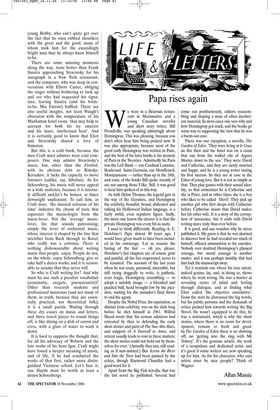Papa rises again
We were in a Béarnais restaurant in Montmartre and a young Canadian novelist and short story writer, Bill Prendiville, was speaking admiringly about Hemingway. This was pleasing, because you don’t often hear him being praised now. It was also appropriate, because most of the good early Hemingway was written in Paris, and the best of his later books is his memoir of Paris in the Twenties. Admittedly his Paris was the Left Bank — rue Cardinal Lemoine, Boulevard Saint-Germain, rue Mouffetard, Montparnasse — rather than up in the 18th, and some of the books Bill spoke warmly of are not among those I like. Still, it was good to hear him spoken of in this way.
As with Dylan Thomas, the legend gets in the way of the literature, and Hemingway the celebrity, boastful, brutal, dishonest and talking his Hollywood Indian language, is a fairly awful, even repulsive figure. Sadly, the more one learns the clearer it is that the private Hemingway was every bit as nasty.
I used to think differently. Reading A. E. Hotchner’s Papa almost 40 years ago, I would have given much to have been included in his entourage. ‘Let us resume the having of the fun’ — oh yes, please. Hotchner’s last chapters are of course grim and painful, all the fun evaporated, never to be resumed. The account of the last years when he was crazy, paranoid, miserable, but still trying doggedly to write, is pathetic, even tragic, Hemingway resembling — to adopt a suitable image — a bloodied and puzzled bull, head brought low by the picadors, waiting for the matador’s final thrust to end the agony.
Despite the Nobel Prize, his reputation, as distinct from celebrity, was on the slide long before he shot himself in 1961. Wilfrid Sheed wrote that ‘his serious admirers had retreated by then to defending the early short stories and parts of The Sun Also Rises, and snippets of A Farewell to Arms, and retreat usually leads to rout in these matters; the short stories could not hold out by themselves for ever.’ (Actually they can, still reading as if new-minted.) But Across the River and Into the Trees had been panned by the critics, though Raymond Chandler had a good word for it.
Apart from the Big Fish novella, that was the last novel he published. Several had come out posthumously, editors reassembling and shaping a mass of often incoherent material. In most cases one sees why and how Hemingway got stuck, and the books go some way to supporting the view that he was a burnt-out case.
There was one exception, a novella, The Garden of Eden. ‘They were living at le Grau du Roi then and the hotel was on a canal that ran from the walled city of Aigues Mortes down to the sea.’ They were David and Catherine, and they are newly married and happy, and he is a young writer tasting his first success. So they are at ease in the Eden of young love. But it is not as simple as that. They play games with their sexual identity, so that sometimes he is Catherine and she is Peter, and at other times she is a boy who likes to be called ‘Devil’. They pick up another girl who first sleeps with Catherine before Catherine insists that David makes her his other wife. It is a story of the corruption of innocence, but it ends with David writing more truly than ever before.
It is good, and one wonders why he never published it. My guess is that he was alarmed to discover how he had revealed too much of himself, offered ammunition to his enemies. Nobody ever doubted Hemingway’s physical courage, but moral courage is another matter, and it was perhaps timidity that had him lock the manuscript away.
Yet it reminds one where his true talent, indeed genius, lay, and, in doing so, shows where he went wrong. He was a master at revealing states of mind and feeling through dialogue, and at finding what Eliot called ‘the objective correlative’. From the start he distrusted the big words, but his public persona and the demands of critics pushed him towards writing the Big Novel. He wasn’t equipped to do this; he was a miniaturist, which is why the short stories, where there is no room for development, remain so fresh and good. In The Garden of Eden there is no showing off, no ‘getting into the ring with Mr Tolstoy’. It’s the genuine article, the work of a scrupulous and dedicated artist, and it’s good if some writers are now speaking up for him. As for his character, who says artists must be nice people? Think of Wagner.
Allan Massie


































































































 Previous page
Previous page